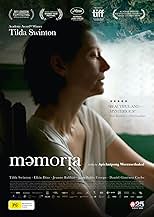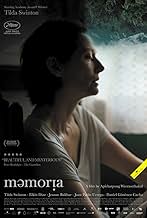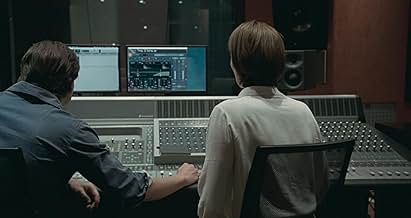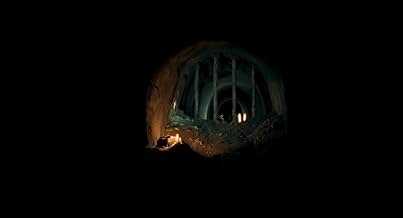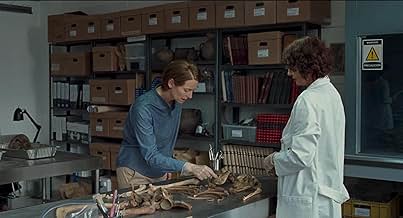Memoria
- 2021
- Tous publics
- 2h 16m
IMDb RATING
6.4/10
12K
YOUR RATING
A woman from Scotland, while traveling in Colombia, begins to notice strange sounds. Soon she begins to think about their appearance.A woman from Scotland, while traveling in Colombia, begins to notice strange sounds. Soon she begins to think about their appearance.A woman from Scotland, while traveling in Colombia, begins to notice strange sounds. Soon she begins to think about their appearance.
- Director
- Writer
- Stars
- Awards
- 9 wins & 27 nominations total
Daniel Toro
- Anthropologist Assistant
- (uncredited)
- Director
- Writer
- All cast & crew
- Production, box office & more at IMDbPro
Featured reviews
*Watched at Cannes 2021 World Premiere*
The work of Thai director Apichatpong Weerasethakul (try saying that five times fast) have never fully been able to register with audiences outside of the festival circuit. He has amassed universal critical acclaim since he graced the Cannes Riviera in 2004 with "Tropical Malady." He creates gaps between his feature films by creating several short films, some of which eventually are spawned into feature-length, such as the 2009 short "A Letter to Uncle Boonmee" becoming the 2010 Palme d'Or winning "Uncle Boonmee Who Can Recall His Past Lives." Now in 2021, Weerasethakul is stepping outside of his native Thailand for "Memoria," (translated from the Latin word "memory") which prompted another return to Cannes, this time netting him the Jury Prize.
The first English-language film for Weerasethakul, "Memoria'' is set within Colombia, following Tilda Swinton from destination to destination. The film opens with a surprising jumpscare illustrating our main character's problem, which is that she often hears a loud crashing noise that seems to be confined entirely within her head. This noise confounds her, leading to an investigation into what exactly it is and why it is happening, which puts her in contact with a sound engineering student, a morgue doctor, and a strange fisherman offering profound insights on memory and identity.
Those familiar with the work of Weerasethakul will know that the plot is not the driving force behind the ultimate narrative. Instead, the visuals and sound work do the bulk of the heavy lifting. Within "Memoria," dialogue is seldom found for long stretches at a time, leaving the viewer to look at the screen like one would look at a painting, soaking in as much information as possible. This restriction of information will irritate those looking for answers to the questions the film raises, which Weerasethakul doesn't have any intention of addressing. The Cannes World Premiere garnered nearly fifty walkouts from disgruntled viewers, and several nodding heads from the slow pacing that were often reawakened by the mysterious crashing noise, which shook the theatre.
Swinton acts less like a character and more like a wandering observer. Never shot in closeup and always present of the world around her, she moves from place to place, learning new information about her condition, all without much dialogue from her end. The first half of the film is where Swinton does most of her traveling, which keeps the film moving at a steady, yet still slow, pace. Much of the "action" within these journeys would be considered filler in most mainstream projects, such as Swinton waiting patiently for the sound engineer to finish his work before addressing her, or an unbroken take consisting solely of car alarms going off.
The last hour of the film is where some will applaud and others will boo (just as they did at the world premiere). Swinton's final journey takes her to a remote village housing a fisherman who claims to remember everything about his life. The two of them engage in an extended conversation that explores the strange connection they share. To an extent, the conversation acts as a vessel for Weerasethakul to talk to his audience about his ideas about cinema and life. It's a bold move by a director not known for boldness, and is one that teeters reshapes the way you look at the world at its best and teeters on self-aggrandizing at its worst. Weerasethakul ties his thesis up in a perfect bow with an ultimate answer that is fittingly incomprehensible and produces several more questions.
"Memoria" is a work for the cinephiles that need an escape from the noise of the modern world. It's wildly beautiful and imaginative, all while challenging your patience and viewpoints. Go in with an open mind, and you find yourself enlightened.
The work of Thai director Apichatpong Weerasethakul (try saying that five times fast) have never fully been able to register with audiences outside of the festival circuit. He has amassed universal critical acclaim since he graced the Cannes Riviera in 2004 with "Tropical Malady." He creates gaps between his feature films by creating several short films, some of which eventually are spawned into feature-length, such as the 2009 short "A Letter to Uncle Boonmee" becoming the 2010 Palme d'Or winning "Uncle Boonmee Who Can Recall His Past Lives." Now in 2021, Weerasethakul is stepping outside of his native Thailand for "Memoria," (translated from the Latin word "memory") which prompted another return to Cannes, this time netting him the Jury Prize.
The first English-language film for Weerasethakul, "Memoria'' is set within Colombia, following Tilda Swinton from destination to destination. The film opens with a surprising jumpscare illustrating our main character's problem, which is that she often hears a loud crashing noise that seems to be confined entirely within her head. This noise confounds her, leading to an investigation into what exactly it is and why it is happening, which puts her in contact with a sound engineering student, a morgue doctor, and a strange fisherman offering profound insights on memory and identity.
Those familiar with the work of Weerasethakul will know that the plot is not the driving force behind the ultimate narrative. Instead, the visuals and sound work do the bulk of the heavy lifting. Within "Memoria," dialogue is seldom found for long stretches at a time, leaving the viewer to look at the screen like one would look at a painting, soaking in as much information as possible. This restriction of information will irritate those looking for answers to the questions the film raises, which Weerasethakul doesn't have any intention of addressing. The Cannes World Premiere garnered nearly fifty walkouts from disgruntled viewers, and several nodding heads from the slow pacing that were often reawakened by the mysterious crashing noise, which shook the theatre.
Swinton acts less like a character and more like a wandering observer. Never shot in closeup and always present of the world around her, she moves from place to place, learning new information about her condition, all without much dialogue from her end. The first half of the film is where Swinton does most of her traveling, which keeps the film moving at a steady, yet still slow, pace. Much of the "action" within these journeys would be considered filler in most mainstream projects, such as Swinton waiting patiently for the sound engineer to finish his work before addressing her, or an unbroken take consisting solely of car alarms going off.
The last hour of the film is where some will applaud and others will boo (just as they did at the world premiere). Swinton's final journey takes her to a remote village housing a fisherman who claims to remember everything about his life. The two of them engage in an extended conversation that explores the strange connection they share. To an extent, the conversation acts as a vessel for Weerasethakul to talk to his audience about his ideas about cinema and life. It's a bold move by a director not known for boldness, and is one that teeters reshapes the way you look at the world at its best and teeters on self-aggrandizing at its worst. Weerasethakul ties his thesis up in a perfect bow with an ultimate answer that is fittingly incomprehensible and produces several more questions.
"Memoria" is a work for the cinephiles that need an escape from the noise of the modern world. It's wildly beautiful and imaginative, all while challenging your patience and viewpoints. Go in with an open mind, and you find yourself enlightened.
Maybe this movie was to overhyped for me, but it probably is the biggest disappointment of 2021 for me.
The concept was ambitious, but the movie still cant decide what it wants to be and in the last 10mins it completely shifts its genre, which was just to much...
Tilda Swinton is brilliant in it, no doubt, but this plot, that gets dragged out more and more (and I usually love slow paced movies, but that was even to much for me) simply doesnt help itself. It reminded me a bit of LOST at times, where it mysteriously opens up a loooot of questions but never answers any of those.... or you could say... "it leaves it up for interpretation". A second viewing would certainly help you to understand those connections better, but I cant make myself endure this another time.
Its such a shame that this amazing idea has not been executed much more smoothly.
The concept was ambitious, but the movie still cant decide what it wants to be and in the last 10mins it completely shifts its genre, which was just to much...
Tilda Swinton is brilliant in it, no doubt, but this plot, that gets dragged out more and more (and I usually love slow paced movies, but that was even to much for me) simply doesnt help itself. It reminded me a bit of LOST at times, where it mysteriously opens up a loooot of questions but never answers any of those.... or you could say... "it leaves it up for interpretation". A second viewing would certainly help you to understand those connections better, but I cant make myself endure this another time.
Its such a shame that this amazing idea has not been executed much more smoothly.
A woman hears noises. The audience will hear the noises, too. The woman jumps when she hears the noises. So too might the audience. She wants to find out what the noises are. We're along for the ride, trying to understand her journey as best we can...
Memoria is a film that's very, very different. Mostly, it's unique in a good way, but it is a challenging watch and if you're like me, you might come out of it not knowing exactly what you just saw... but hopefully, you'll appreciate how it made you feel.
I read this was only ever going to be shown theatrically, and that it would never get a streaming release or be released on DVD/Bluray. I thought that sounded pretentious, but now after seeing the film, if they stick with that plan, I understand why. Memoria is a quiet and sometimes deathly still film. I don't know if most people (myself included) would be able to concentrate on it completely if they were at home, and had mobile phones and the like as distractions.
This becomes clearest in the second half, which warps and seemingly deconstructs time itself as you're watching it. I know how pretentious that sounds. But approximately the last half is one long sequence that is slow in a way that's kind of awe-inspiring. And I can only estimate that this concluding chunk of the film was one half of it. It may have been more like 70 minutes. It could've been as short as half an hour.
With no clear narrative or structure, you're left no choice but focus intently in on what is (or isn't?) happening. It ends up being hypnotic. Some people were audibly relieved when it was over. I'd be lying if I said I was riveted the whole time, but I was too impressed with how Memoria as a whole felt to watch unfold to say it came anywhere close to being a waste of time.
Tilda Swindon deserves praise, too. I think the film asks a lot of her, and asks her to do it all subtly, too. She gives a great performance, and one that I don't think many others could do. Overall, this is a very slow and perplexing film, but I can't call it boring, and because of the unique experience it provided, I wouldn't call it frustrating or pretentious, either. It's absolutely worth 137 minutes of your attention, as long as you're mostly onboard with seeing something out there, and one that seeks to give you a unique film-watching experience more than it gives you a traditional narrative, or any easy answers.
Memoria is a film that's very, very different. Mostly, it's unique in a good way, but it is a challenging watch and if you're like me, you might come out of it not knowing exactly what you just saw... but hopefully, you'll appreciate how it made you feel.
I read this was only ever going to be shown theatrically, and that it would never get a streaming release or be released on DVD/Bluray. I thought that sounded pretentious, but now after seeing the film, if they stick with that plan, I understand why. Memoria is a quiet and sometimes deathly still film. I don't know if most people (myself included) would be able to concentrate on it completely if they were at home, and had mobile phones and the like as distractions.
This becomes clearest in the second half, which warps and seemingly deconstructs time itself as you're watching it. I know how pretentious that sounds. But approximately the last half is one long sequence that is slow in a way that's kind of awe-inspiring. And I can only estimate that this concluding chunk of the film was one half of it. It may have been more like 70 minutes. It could've been as short as half an hour.
With no clear narrative or structure, you're left no choice but focus intently in on what is (or isn't?) happening. It ends up being hypnotic. Some people were audibly relieved when it was over. I'd be lying if I said I was riveted the whole time, but I was too impressed with how Memoria as a whole felt to watch unfold to say it came anywhere close to being a waste of time.
Tilda Swindon deserves praise, too. I think the film asks a lot of her, and asks her to do it all subtly, too. She gives a great performance, and one that I don't think many others could do. Overall, this is a very slow and perplexing film, but I can't call it boring, and because of the unique experience it provided, I wouldn't call it frustrating or pretentious, either. It's absolutely worth 137 minutes of your attention, as long as you're mostly onboard with seeing something out there, and one that seeks to give you a unique film-watching experience more than it gives you a traditional narrative, or any easy answers.
"Enjoy the silence" a title card states as Apichatpong Weerasethakul invites the viewer to experience MEMORIA; And, an experience it truly is as Weerasethakul's metaphysical film infuses the viewer with natural sights and sounds. That opening acts almost as an overture, as the Director's personal sketches are superimposed over still photographs from the production of the film - all 'scored' to absolute silence.
MEMORIA's protagonist is Jessica (Tilda Swinton) who awakes one morning to a mysterious sonic bang. Jessica is a botanist living in Columbia who is visiting her sister in Bogota. The bang continues to haunt Jessica as she goes about her daily life. Slowly, she feels that her mind is slipping - is she imaging the sounds? People she believes she has met don't seem to exist. On a drive back to her home in Medellin, she meets (or does she?) a man named Hernan (Elkin Diaz) and they spend a long afternoon together.
Weerasethakul's film doesn't have a formal plot. Swinton is so attuned to her filmmaker's methods that she inhabits rather than acts. The Director's method is to utilize only the most minimal of editing with extended takes. Cinematographer Sayombhu Mukdeeprom exquisitely captures the crucial mood and beauty of the natural world on 35mm film. The sonic bangs seem ever more loud because the sound design accentuates an organic soundscape; even the human voices are seemingly mixed below normal levels.
"Sometimes there's no escape except in dreams" reads another title card after the 'overture'. The classical definition of "Memoria" can be very loosely translated as "Memory", but its true meaning is much deeper. It describes a way in which the human mind stores and utilizes those thoughts and senses. The sonic bangs can be seen as a way of triggering Jessica's states of consciousness. Her own Memoria.
MEMORIA isn't a film for general audiences. Indeed, it's release is a never-ending world tour with the Producers claiming it shall never be sold for home viewing - streaming or physical media. It's very much a communal experience in a theater. The aural and visual tour de force to be savored not only by the individual -- but, by the audience in toto.
MEMORIA's protagonist is Jessica (Tilda Swinton) who awakes one morning to a mysterious sonic bang. Jessica is a botanist living in Columbia who is visiting her sister in Bogota. The bang continues to haunt Jessica as she goes about her daily life. Slowly, she feels that her mind is slipping - is she imaging the sounds? People she believes she has met don't seem to exist. On a drive back to her home in Medellin, she meets (or does she?) a man named Hernan (Elkin Diaz) and they spend a long afternoon together.
Weerasethakul's film doesn't have a formal plot. Swinton is so attuned to her filmmaker's methods that she inhabits rather than acts. The Director's method is to utilize only the most minimal of editing with extended takes. Cinematographer Sayombhu Mukdeeprom exquisitely captures the crucial mood and beauty of the natural world on 35mm film. The sonic bangs seem ever more loud because the sound design accentuates an organic soundscape; even the human voices are seemingly mixed below normal levels.
"Sometimes there's no escape except in dreams" reads another title card after the 'overture'. The classical definition of "Memoria" can be very loosely translated as "Memory", but its true meaning is much deeper. It describes a way in which the human mind stores and utilizes those thoughts and senses. The sonic bangs can be seen as a way of triggering Jessica's states of consciousness. Her own Memoria.
MEMORIA isn't a film for general audiences. Indeed, it's release is a never-ending world tour with the Producers claiming it shall never be sold for home viewing - streaming or physical media. It's very much a communal experience in a theater. The aural and visual tour de force to be savored not only by the individual -- but, by the audience in toto.
This movie is very hard to watch and requires much patience. If you can connect with the movie, it will make it easier to watch. There are very long and still sequences. From the beginning to the end of the film, confusion prevails. We cant really understand what is happening. Nothing is clear. And the movie does not give us many answers. This is a "feel" movie. If you cant connect with the characters or the storyline it will be a disappointing experience for you.
Did you know
- TriviaIn an unconventional move, art-house film distributor Neon is releasing Memoria in the USA "from city to city, theater to theater, week by week, playing in front of only one solitary audience at any given time." And furthermore, according to IndieWire (10/5/21) the film will only play in theaters and it will not become available on DVD, on demand, or on streaming platforms. They later abandoned this release strategy though after touring through only New York and Chicago and the film was eventually released in many cities simultaneously across North America in April, 2022.
- Quotes
Older Hernán Bedoya: I remember everything, so I limit what I see.
- ConnectionsReferenced in Radio Dolin: Stream with Anton Dolin (2021)
- SoundtracksMemoria
Written by César López
Piano performed by César López
Cello performed by Sandra Parra
Recorded by Julio Monroy
Recorded in Bogotá, Columbia by Burning
(C) 2020 Burning
- How long is Memoria?Powered by Alexa
Details
- Release date
- Countries of origin
- Official sites
- Languages
- Also known as
- Пам'ять
- Filming locations
- Production companies
- See more company credits at IMDbPro
Box office
- Gross US & Canada
- $52,656
- Opening weekend US & Canada
- $6,797
- Dec 26, 2021
- Gross worldwide
- $588,713
- Runtime2 hours 16 minutes
- Color
- Sound mix
- Aspect ratio
- 1.85 : 1
Contribute to this page
Suggest an edit or add missing content





